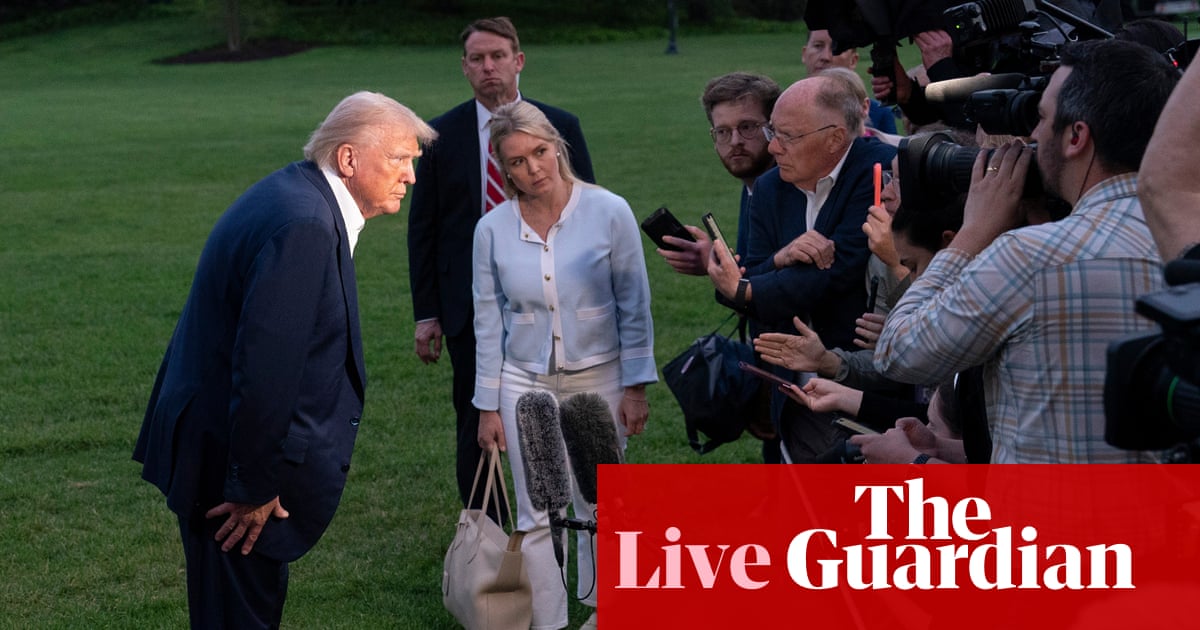There has been more reaction to Trump’s plan for 100% tariffs on films made in “foreign lands”, with a UK lawmaker warning it “is not in the interests of American businesses”.
Dame Caroline Dinenage is a member of the right-leaning Conservative opposition party who chairs the UK parliament’s culture committee. She said members of the committee had warned “against complacency on our status as the Hollywood of Europe” in their report on British film and high-end TV, published last month.
She added:
Our video team have produced this clip withDonald Trumpspeaking about his film tariff plan, accusing other countries of “stealing” the US’s film-making capabilities and attacking the California governor (Gavin Newsom, although he doesn’t name him when speaking to reporters outside the White House).
Meanwhile,Germanyhas said it “strongly rejects” criticism by US Secretary of StateMarco Rubioof its domestic spy agency’s decision to label the far-right AfD party as an extremist group.
“I reiterate that the insinuations contained (in his comments) are certainly unfounded,” foreign ministry spokesman Sebastian Fischer said.
Rubio had slammed Friday’s move against the AfD, which came second in February elections, as “tyranny in disguise” and Vice President JD Vance also spoke out against it.
On Sunday, the German foreign ministryhad posted on Xabout the decision to label the AfD as extremist:
You can read more here:
In the UK, the PA news wire has more on the response to Trump’s film tariffs.
Philippa Childs, head of the Broadcasting, Entertainment, Communications and Theatre Union (Bectu), saidthe UK industry is “only just recovering” from the impact of the Covid-19 pandemic, when many productions were delayed or cancelled.
She said:
It is not clear how a tariff on international productions could be implemented. Many films are shot across numerous countries, including the US and UK.Last year, the UK government introduced the Independent Film Tax Credit, which allows productions costing up to £15m to benefit from an increased tax relief of 53%.
In announcing his plan for 100% tariffs on movies made in “foreign lands”, Trump attacked “incentives” offered by other countries, which he said were an attempt to “draw our filmmakers and studios away from the United States”.
Hello and welcome to the Guardian’s live coverage of US politics with news thatDonald Trump’s plan to impose 100% tariffs on movies “produced in foreign lands”will send shock waves through the industry globally, according to industry body Screen Producers Australia (SPA).
“At this stage, it is unclear what this announcement means in practice or how it will be applied and implemented”, said the SPA chief executive, Matthew Deaner.
“There are many unknowns for our industry, but until we know more, there’s no doubtit will send shock waves worldwide.”
In the UK, the Bectu union representing staff working in the screen industry warned it could be a“knock-out blow”for a sector still recovering from Covid and strikes. It called on the UK government to “move swiftly to defend this vital sector … as a matter of essential national economic interest”.
Trump had announced the move on Sunday night, citing what he termed a“national security threat”to the US film industry. In a post on Truth Social, he claimed to have authorised the commerce department and the US trade representative to immediately begin instituting such a tariff. There were no details on the implementation. It was not immediately clear whether the move would target production companies, foreign or American, producing films overseas. He wrote:
More on this soon. And in other developments:
Trump has said he is directing his government toreopen and expand Alcatraz, the notorious former prison on an island off San Francisco that has been closed for more than 60 years.In a post on his Truth Social site on Sunday evening, Trump said America was “plagued by vicious, violent, and repeat Criminal Offenders”. He said a rebuilt Alcatraz would house “America’s most ruthless and violent” criminals.
Trump has said that he does not know whether he must uphold the US constitution, the nation’s founding legal document.In a NBC News interview, he was asked if people in the US – citizens and non-citizens alike – deserve the due process of law, as the US constitution states. Trump said: “I’m not a lawyer. I don’t know.”
Trump would not rule out using military force to gain control of Greenland, a fellow Nato member with the US.Since taking office, the US president hasrepeatedly expressed the ideaof US expansion into the strategically important territory, triggering widespread condemnation and unease both on the island itself and in the global diplomatic community.
The heads of embattled US public broadcasters, National Public Radio (NPR) and the Public Broadcasting Service (PBS), defended themselves against efforts by theTrump administrationto cut off taxpayer funding.PBS’s chief executive,Paula Kerger, told CBS News’s Face the Nation that Republican-led threats to withdraw federal funding from public broadcasters had been around for decades but are “different this time”.
